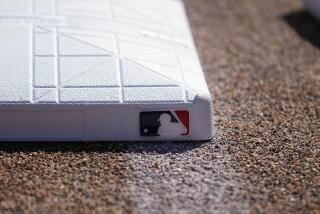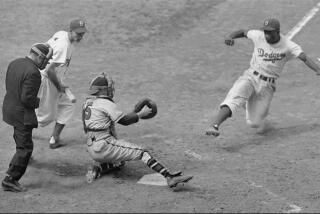Special Report / CRIME & SPORTS ’95 : Is It Fair to Expect Sports Heros to Serve as Role Models? : Icons: Some fear that athletes who get into trouble are setting a bad example for youths. But others say expectations are too high.
- Share via
Cal Ripken Jr. was sitting on the steps of a house in Santa Monica, just being himself, when some TV guy suggested putting a cap on Ripken’s head for the promotion he was about to shoot.
“I’ve spent the last year trying to get this face famous and now you want to cover it up?” Ripken joked.
In an era in which role models are at a premium, Ripken’s lap around Baltimore’s Camden Yards last season--cap-less, after he set the record for consecutive major league games played--made the Oriole shortstop our nation’s latest sports icon.
He is credited with saving baseball. All he has to do to maintain his place in fans’ hearts is keep out of trouble, which is something that a few of Ripken’s fellow athletes are having difficulty doing. A Times survey of 1995 newspaper and wire service reports and court records found 252 police incidents involving 345 U.S. and Canadian sports figures.
Some believe these incidents are diminishing the traditional view of athletes as role models.
But is it fair of society to hold athletes to a higher standard?
There are some who think of athletes merely as entertainers, but a more common belief is that they should serve as exemplary figures.
“I don’t believe necessarily that you have to say that an athlete is a role model, and I don’t believe in throwing a lot of responsibility on an athlete, but I think an athlete himself should understand the power of his influence,” Ripken said.
“Technically, when you get down to it, your role models are the people that are the closest to you, and they should be. No one should put an athlete in front of their parents in terms of influence.”
*
Barely 24 hours after Denver Bronco wide receiver Mike Pritchard was arrested in October for driving while impaired after his Porsche hit two women, injuring one seriously, he was announced as one of three candidates for the team’s nominee as the National Football League’s Man of the Year.
The vote to select him as a candidate had been taken in May, months before the accident, because of his work combating illiteracy. He ultimately did not receive the nomination.
Pritchard says he was not legally drunk but was impaired enough to lose control of his car on his way home near Boulder, Colo.
He has since started a personal campaign to tell people that you do not have to feel drunk to be drunk. And in doing so, he has become the target of public anger and disdain.
“A lot of people have called what I did an irresponsible act, not because I was a football player, but because as a human it was irresponsible,” Pritchard said. “I say to them that they are right, and I hope people will learn from it because it has been publicized.”
Pritchard pleaded guilty to careless driving and driving while impaired. He received 18 months’ probation and 100 hours of community service, was ordered to attend an alcohol rehabilitation program, and was fined $1,100.
He was not disciplined by the team. But it might have seemed hypocritical for the Broncos to impose a penalty on him. The club’s director of football operations, Bob Ferguson, was arrested on suspicion of drunk and careless driving earlier in the year. His trial is scheduled for Jan. 3.
*
Though crime rates are down nationally, California Atty. Gen. Dan Lungren says many criminologists believe that the United States is on the verge of a potential “blood bath” by juveniles as that age group increases in the next decade. He believes that the blame should fall on the sum of a child’s experiences, but he also cites the failings of athletes as a major contributor to the problem of juvenile crime.
Others disagree, however, that athletes should be role models.
“Why are we so obsessed with athletes as heroes, instead of [their] just being the entertainers they are?” asked Todd Crosset, assistant professor of sports management at the University of Massachusetts. “Then we try and make them into role models.
“Parents, pharmacists, the elderly lady down the street. These are people you learn about life from.”
More to Read
Go beyond the scoreboard
Get the latest on L.A.'s teams in the daily Sports Report newsletter.
You may occasionally receive promotional content from the Los Angeles Times.










